#Welsh
Text
For assorted reasons, we generally associate Tolkien-esque Dwarves with Scottish accents. But Middle-earth is loosely based on the British Isles as a whole (sorta, it was originally meant as a "mythology for England"). That brings us to an obvious question:
If you are unfamiliar with what a Welsh accent sounds like, a video of Michael Sheen has been provided below the cut.
youtube
115 notes
·
View notes
Text
so I'm in the office when I hear it. the EIC, in the corner, my manager's manager, lights up the batsignal and voices a cry for aid:
"is anyone here who speaks Welsh?"
immediately, all heads turn to Charles' desk. Charles is Welsh. Charles takes several days to recover from the shock every time someone on a National Trust podcast mispronounces Llanidloes. surely Charles will answer the call.
Charles, the bloody nerve of him, is on Annual Leave to spend the Easter holidays with his son.
at this point I realise that several heads, including my manager's, are turning to me.
I do not speak Welsh.
I was brought up by a Welsh speaker, my grandmother, but given that we live in London and noone else in the family speaks Welsh, I only really picked up the most basic of family pleasantries. I can say cheers and goodnight, I can offer and order hot beverages, and I can answer the six questions people immediately ask when they find out you speak even a little bit of Welsh (the answer to all of these is as far as I can tell, yes but nobody says that. yes but it's baby talk. yes but it was a marketing scam. you know the ones)
I also have a master's degree in, amongst other things, medieval Welsh. as attention turns to me, I weigh up the possibility that the EIC needs someone to urgently translate Culhwch ac Olwen into modern English.
it seems unlikely. however, my CV says I have basic Welsh, and I need this job, so I head to the EICs desk with the thudding tread of someone bound for the gallows
further context-- 90% of my job is combing through business documents for aside phrases indicating business changes. this takes a lot of cross-referencing and close reading. I find this hard in my native language. I find it extremely hard in languages I'm fluent in. the idea of doing it in Welsh, a language where my conversation options are limited to "good morrow sir! the English advance on our left flank!" or "Mr fishy likes to swim", fills me with fathomless dread. in my head, I am writing my application to the next job.
the EIC turns a page around on the desk. "how do you pronounce this?"
I look at the word, relief beginning to sink in. Welsh is phonetic. even if I don't know this word, I can read it.
I do a double take. "Dai?"
"are you sure?" the EIC asks. "should I call Charles on his holidays just to check?"
"it's Dai," I repeat.
"it's not different if it's Welsh?"
I have absolutely no idea what she thinks the Welsh are doing to innocent vowel sounds that the English are not already doing. "it's Dai. like Dai Llewellyn."
"it's the same every time?"
"... yes"
"oh good." the EIC puts away her sheet and lets me go back to my desk.
as I sit down, the news editor at the next desk looks up. "so," he asks. "is it true that the Welsh for jellyfish is
61 notes
·
View notes
Text
Irish, Welsh and Scottish Gaelic speakers, I need your help! 🇮🇪🏴🏴
For a piece of academic writing I am working on right now, I was wondering if in the context of those three languages, you have positive or negative examples of:
1) The presence of non-standard dialects digitally or in the media (any content creator you know, any regular speakers on the radio that actively uses a non-standard dialect, or on the contrary, you only encounter standard Irish/Welsh/Gaelic. If you have any example of non-standard writing too, for example in the printed press, I am all ears)
2) Do you speak and/or write a non-standard dialect and have been looked down upon for it by other speakers? If yes what dialect and in what context
3) What do you think about purification practices in which loan-words from English are replaced by new words? Which words do you use? If you study the language formally, which are taught to you?
Thank you, and please reblog!
- A grateful Celtic student
#Irish#Gaelic#Scottish Gaelic#Welsh#gaeilge#cymraeg#Gàidhlig#Ireland#Scotland#Wales#Celtic languages#Minroty languages#Linguistics#Standardisation#Celtic#Celtic studies#Languages#Alba#Mostly for native speakers but also non-native fluent speakers that regularly interact with the language
45 notes
·
View notes
Text

🏴
#ai artwork#ai girl#ai art#ai generated#ai image#digital art#sexy ai art#sexy ai generated art#ai sexy#sexy titts#huge tiddies#huge cleavage#huge titts#hot and sexy#so hot 🔥🔥🔥#so hot and sexy#hot as hell#hot as fuck#fav#absolute fav#welsh#ai ginger#ginger#dress#non e#outdoors#ai babe#ai beauty#ai mode#ai woman
33 notes
·
View notes
Text



21 notes
·
View notes
Text
It's that time of year again where Mari Lwyd starts to be talked about and shared around and an INCREDIBLY misleading post gets shared a lot. As someone who grew up with Mari Lwyd I wanted to clear some things up.
Also hello, if you are unaware who Mari Lwyd is. This is about the Welsh tradition of the horse skull who visits houses during the Christmas to New Years period in Wales asking for alcohol.
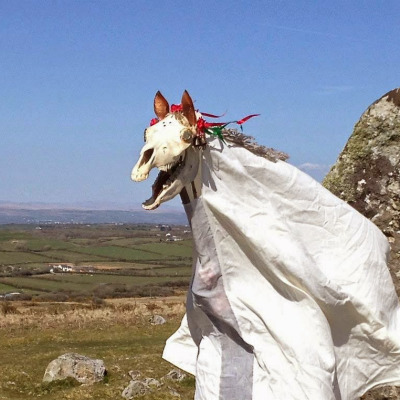
First off and probably the most important one:
Mari Lwyd is not a cryptid!
I can not emphasise this enough. She. Is. Not. A. Cryptid. There is no story or mystery about a ghost or zombie horse roaming the Welsh valleys. She's not even supposed to be a ghost or a zombie. It's just a horse skull on a stick with a guy under a sheet. She's a hobbyhorse and a folk character used to tell Welsh stories and keep songs alive. When people spread the misinformation that she's a cryptid, it's the equivalent of saying Kermit the Frog is a cryptid.
She is actually only one character in a wider cast of characters who go door to door or, in more modern times, pub to pub. The cast of characters can change town to town and village to village but there are some common ones I see time and time again. The Leader, the Merryman, The Jester and The Lady are just some I see regularly. Punch and Judy used to be more popular a few years ago but I haven't seen them in a while as their tradition has mostly fallen out of popularity. In most cases, almost the whole cast will be played by men. Even the characters are considered and referred to as female. Though this again depends and varies by which group is partaking in the Mari Lwyd tradition.
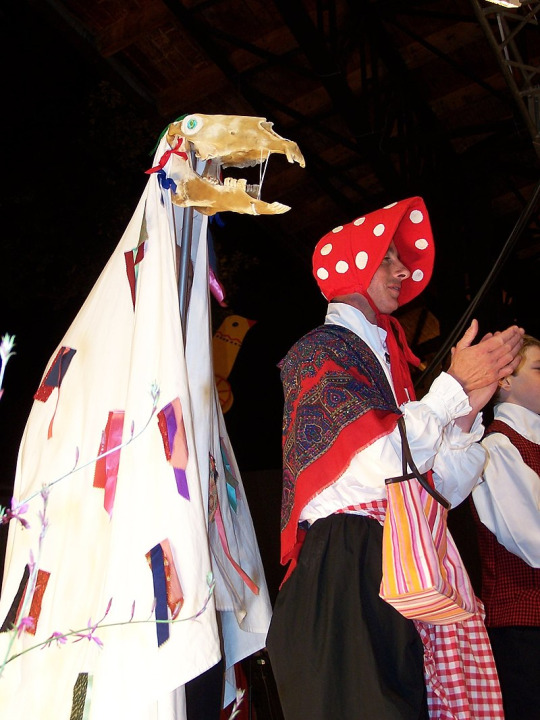
This point also goes onto my second point,
Mari Lwyd does not rap.
I think this comes from a very common misunderstanding of what rap is vs spoken word. Rap is a very specific style of music originating from the African American communities of the USA and has it's own structure and motifs unique to it. It's a lot more complex than people give it credit for as a style of music and just flippantly assign anything similar to it as being rap. If someone is talking fast or reciting poetry, it is not rap. Or anything that is an exchange of words between two people is not a rap battle. Mari Lwyd does not do rap, actually something that gets left out of these posts is the fact Mari Lwyd does not even speak. It's actually the Leader, who does all the speaking and song based banter between the house/pub owner for entry. Mari Lwyd just clicks her mouth, bites people and bobs her head around.
I think Mari Lwyd is a really beautiful and unique part of Welsh culture. She's not actually as wildly celebrated as a lot of the posts make her out to be. Actually, I think most Welsh people themselves learn about Mari Lwyd through the internet as well. Her popularity is increasing thanks to the drive of local groups wanting to keep the traditions alive and a renewed desire to document Welsh traditions before they're gone. Which is why it's such a shame that she's turned into something she's not to earn horror points on the internet. I think this is why it bothers me so much to see the misunderstandings of the culture and the folk tradition. Mari Lwyd's origin is very hot debated as well as how long it's been going on for. But I think it's thanks to a lot of traditions like this that the Welsh language and our stories weren't lost forever. Welsh culture is recovering as is the language. But it's still in a very fragile place. I think it's why it's important to document and correct information when it's spread.
Anyway, if you want to see the tradition in action, here's a lovely video from the Cwmafan RFC going to one of the pubs for charity. It includes the song exchange with the pub owner for entry and the whole pub singing and joining in once Mari Lwyd and the rest are inside.
youtube
As well with another video from St Fagan's showcasing the more traditional and door to door form with the larger cast.
youtube
18K notes
·
View notes
Text
I figured the Jolene loving site needed to see this
9K notes
·
View notes
Text
Please help the National Museum Of Wales

Please sign the petition!!!!
You don't need to be living in Wales or the uk to sign.
#wales#welsh#museum#history#petition#signal boost#geology#paleontology#palaeoblr#support education#support history
3K notes
·
View notes
Text
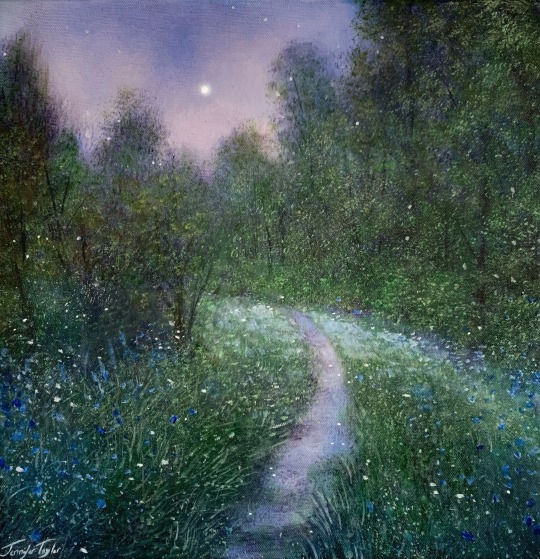
Nocturnal Sapphire - Jennifer Taylor , 2022.
Welsh , b. 1982 -
Oil on canvas , 40 x 40 cm.
713 notes
·
View notes
Text
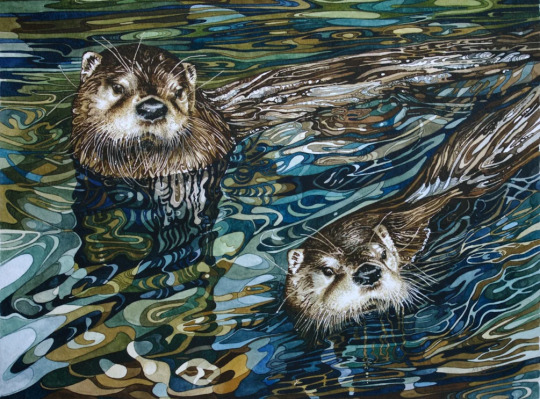
Rhian Symes - Looking at Me Looking at You. 2016. Watercolour.
822 notes
·
View notes
Text
I was sharing an apartment with Discord from My Little Pony and I was helping him learn how to speak Welsh. I don’t speak Welsh.
476 notes
·
View notes
Text

#ts2#the sims 2#ts2 gameplay#owlcreek#welsh#owlcreeklegacy#dylanlink#alicewelsh#honestly she WOULD love it
21 notes
·
View notes
Text
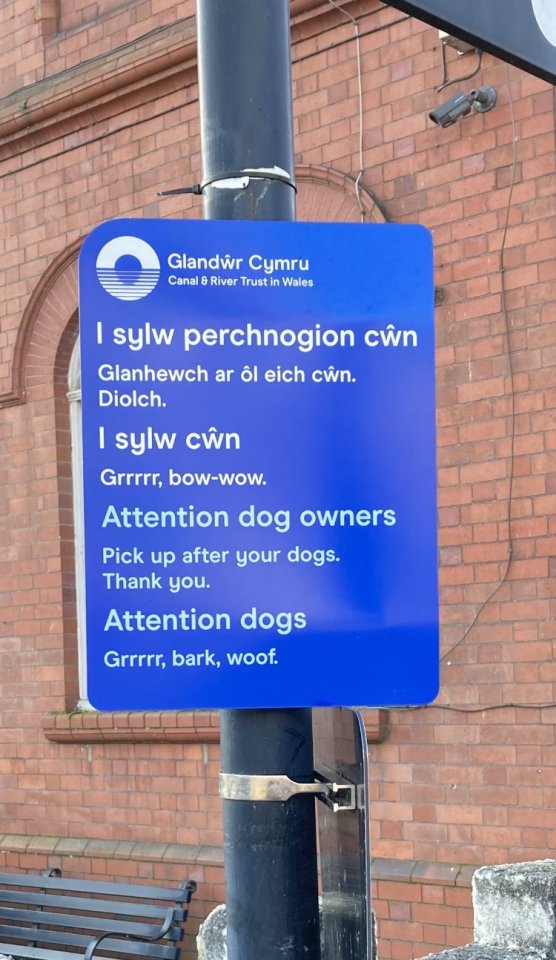
This is a funny sign and all but I think the main takeaway should be that there is Dog English and Dog Welsh (Cimraeg?!?!?!?)
4K notes
·
View notes
Text

Happy Birthday Michael Sheen
This shouldn’t have taken all day but it did.
… worth it!
#happy birthday Michael Sheen#michael sheen#happy birthday#forever michael sheen#blue eyed beauty#fabulous actor#welsh#welsh actor
844 notes
·
View notes
Text
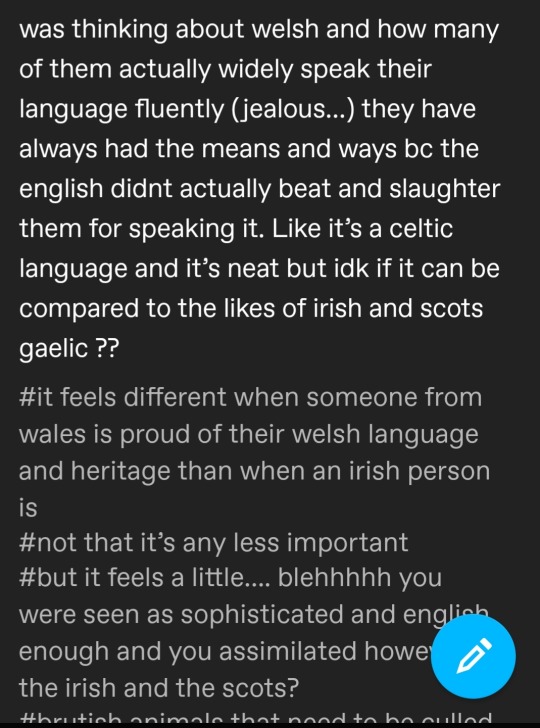
I'd like to preface this with that this is a screenshot of a post I saw a few days ago in the #welsh tag and that the OP has since deleted this post, but the sentiment is something I'd like to address since I see a lot of parallels with this kind of thinking in other contexts, such as in LGBTQIA+ rights conversations.
So, the most obvious elephant in the room is the idea that Welsh is super widely spoken in Wales now and that it isn't in as much danger as other Celtic languages. This idea is wishful thinking at best and erases the very real danger that Welsh is in and that it could be lost just as easily as Irish or Scottish Gaelic. Cornish (which is related to Welsh) actually did die out and has had to be revived. To make a metaphor out of this, we classify languages on a scale of non-threatened to endangered in a similar way to how we classify species.
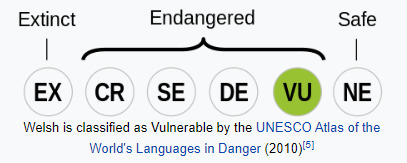
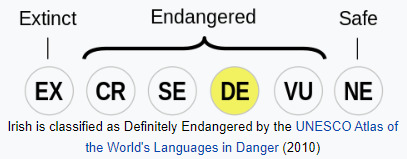
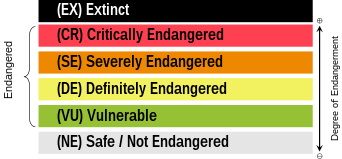
Here are the statuses of Welsh and Irish as of 2010 (above) and the statuses of Lions and Tigers (below).

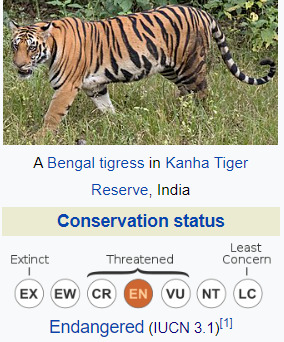
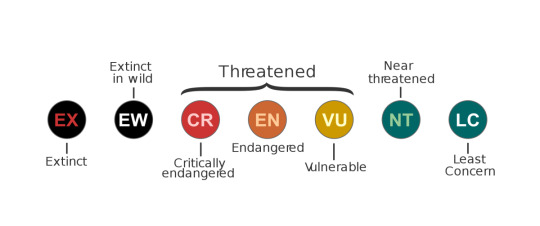
On paper tigers are more 'in danger' than lions. But that does not mean that lions are suddenly not in danger at all. The little bracket above CR, EN and VU labels all of these classifications as threatened. It isn't (and definitely shouldn't) be a competition of 'who is most in danger' because you do not want the thing you care about (whether it be a species or a language) to be in danger.

To come back to the original screenshot "they* [Welsh speakers] have always had the means and the ways because the English didn't beat or slaughter them for speaking it"- on the most basic of levels, this is just incorrect. The Welsh Not was a wooden token hung around schoolchildren's necks if they spoke Welsh in school. If someone else spoke Welsh the Not would be hung around their neck. At the end of the school day, whoever was wearing the Not would be beaten and caned by their teachers. I needn't go into much detail but there have been concerted efforts to beat Welsh out of schoolchildren. With the lions vs tigers metaphor, making the claim Welsh speakers have never been beaten for speaking Welsh because they always had the means and ways, while Irish speakers were beaten and never had the means or ways is like claiming poachers have never shot lions, only tigers. Bottom line is, lions and tigers are both victim to poaching and both species have suffered as a result. Similarly, Welsh and Irish have both suffered language loss and both need conservation efforts in order to survive.
(*sidenote- the consistent use of 'them' and 'they' in the original post is definitely indicative of a 'us vs them' sentiment which is a deeply unhelpful attitude to have when it comes to endangered languages and the Celtic languages in particular)
I see parallels with LGBTQIA+ rights in this situation. When equal marriage came in for gay and lesbian couples in the UK in 2014, many allies began to act like gay rights had now been achieved and that gay issues had been done, they're solved. Except, they really weren't (and aren't). Progress has been made in Wales and undeniably Welsh is doing the best out of the living Celtic languages. But that doesn't mean Welsh has been saved or that full equality for Welsh speakers has been achieved. It very much hasn't. The sentiment of the post in the screenshot is not conducive to helping Irish or Scottish Gaelic. Putting down Welsh speakers and erasing Welsh-language history will not save Irish or Scottish Gaelic. Pretending Welsh has had it easy in some kind of lap of luxury is a deeply harmful and bogus claim.
I'll address the tags under the cut as this post is getting long.
To address the tags, personal feelings ≠ an accurate reading of a situation. Nor is it praxis, for that matter. Why is pride in Welsh different/less good than pride in Irish? Is it the assumed proximity to England? If so, that's a terrible claim to make. Not only that, but Scotland is also next to England- does that make pride in Scottish Gaelic the same as pride in Welsh according to this metric? It's a ludicrous thing to say and deeply insensitive to the needs of Scottish Gaelic and Welsh speakers, who cannot help any current or former proximity to England.
Additionally, proximity to England ≠ worse. I know it's a popular internet joke to hate on England because of English attempts to eradicate the Celtic languages, but when the joke becomes praxis, it does not help. England ≠ a place devoid of Celtic languages either. Many English counties near the Welsh border actually have communities of Welsh speakers, such as Oswestry (Croesoswallt) in Shropshire. Cornwall is also home to many speakers of revived Cornish. It does a disservice to Celtic speakers in England to insinuate that proximity to England taints or corrupts them somehow. This is how ethnonationalism starts and we ain't about that.
And "#it feels a little.... blehhhhh you were seen as sophisticated and english enough and you assimilated however the Irish and the Scots? #brutish animals that need to be culled". So, this is arguably one of the worst things to say about a Celtic language- or any threatened language in general. First of all, the 'you were seen as' - 'you' is very telling. The switch from 'them', 'they' to 'you' indicates that this sentiment is aimed at Welsh speakers directly. This was likely a subconscious thing that OP wasn't thinking about when they wrote this. But it does indicate unhealthy feelings of jealousy and bitterness unfairly directed at Welsh speakers, who are also struggling. This righteous anger at the decline of Irish and Scottish Gaelic would be better directed at efforts to help promote those languages- some useful things to get involved with are LearnGaelic, similar to DysguCymraeg but for Scottish Gaelic or supporting channels such as Irish channel TG4 by watching their programmes.
The idea that Welsh speakers were or are 'sophisticated and english enough' is insulting and carries with it a lot of baggage of how any of these assumptions came about. Welsh speakers were definitely not seen as sophisticated. Where Welsh was 'tolerated', it was treated as a curiosity, a relic of a bygone age. Classic museification which all Celtic languages and cultures suffer from as well. Welsh was not tolerated in any legal sense since 1535- with English becoming the only valid administrative language and the language of Welsh courts after England annexed Wales into its Kingdom. Monolingual Welsh speakers suddenly had no access to any legal representation, unless they learned English. This is no voluntary assimilation- it is an act of survival for many speakers of minoritised languages to 'assimilate' into the dominant culture, or else risk losing access to legal security and other kinds of infrastructure. You need only ask any non-native English speaker living in an Anglophone country what that process is like. Welsh people did not see English incursion as an opportunity to become 'sophisticated and english enough', they had to assimilate in order to survive.
The "Irish and the Scots? #brutish animals that need to be culled" is also painfully misrepresenting a very complex social and political process that unfolded over the span of hundreds of years. The phrasing itself of 'brutish animals that need to be culled' speaks to righteous anger at the damage done to these languages and cultures, but it reinforces negative stereotypes about the Irish and Scots themselves. It also is more complicated than a simple English hatred of anything non-Anglo, since the English conception of particularly the Irish changed a lot over the centuries. It was (and still is) rarely consistent with itself. See: the enemy is both strong and weak. The very earliest Celticists were by and large, Anglos or French.
Ernest Renan (1823-1892) for example, was an early French Celticist who published La Poésie des races celtiques (Poetry of the Celtic Races- English translation) in which he says:
"... we must search for the explanation of the chief features of the Celtic character. It has all the failings, and all the good qualities, of the solitary man; at once proud and timid, strong in feeling and feeble in action, at home free and unreserved, to the outside world awkward and embarrassed. It distrusts the foreigner, because it sees in him a being more refined than itself, who abuses its simplicity. Indifferent to the admiration of others, it asks only one thing, that it should be left to itself. It is before all else a domestic race, fitted for family life and fireside joys. In no other race has the bond of blood been stronger, or has it created more duties, or attached man to his fellow with so much breadth and depth"
Yeah. This guy (unsurprisingly) was a white supremacist. Note that this sentiment is being applied to all people considered Celtic by Renan- Irish, Welsh, Breton, Scottish, Cornish, Manx etc. None unscathed by the celtophobia of the day. In this period, Celticity was romanticised (yet disparaged at the same time). It is less 'brutish animals' and more 'archaic, time-frozen peoples' in this period. Of course, 'brutish animals' attitudes towards Celticity did still exist, but it is disingenuous to act as if it was this attitude alone which drove English celtophobia. Like many things, it is always more complicated and never clear cut as it might seem.
I'll bring this to a close shortly, but returning to OP's suggestion that the Welsh assimilated and the Scots and Irish did not, is also incorrect in that some Scots did have to assimilate to survive as well. The Statutes of Iona (1609) required Scottish Gaelic speaking Highland chiefs to send their sons away to be educated in Scots and/or English in Protestant schools. Many did as the statutes required, which led to further language loss in the Highlands of Scottish Gaelic. These are acts of survival- and not ones always taken willingly.
This has been a long post but it's one which I felt I wanted to address. There's no need for infighting between speakers of Celtic languages over who has it worse. There isn't any answer to that question, nor is it a good use of time or energy. All in all, the Celtic languages have suffered greatly over the years and its only just now that some of them are turning a corner. If you care about these languages, put your energy into something good. Only through active work will these languages be saved for generations to come.
#long post#lukes originals#cymraeg#gaelige#gaidhlig#Irish#Welsh#Scottish Gaelic#politik#not dictionary related#Celticist#Celtic Studies#This took a lot of energy to write so if you found this post useful please consider reblogging
1K notes
·
View notes